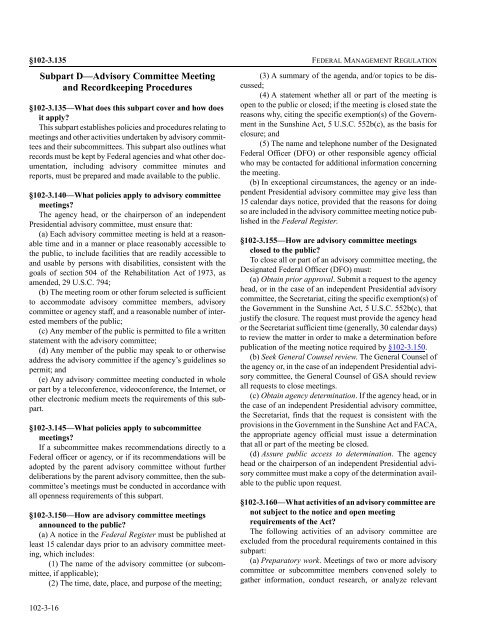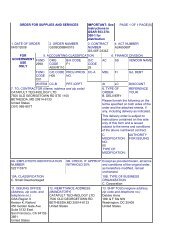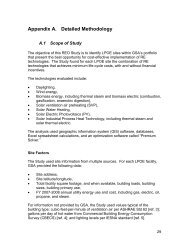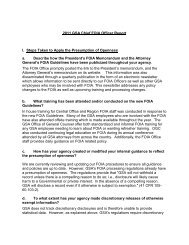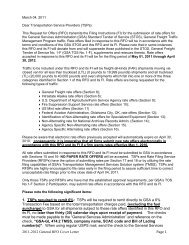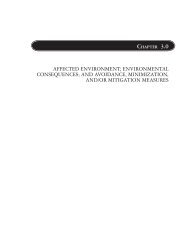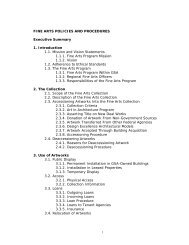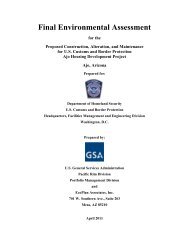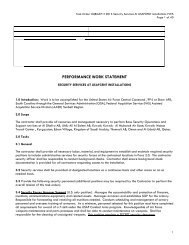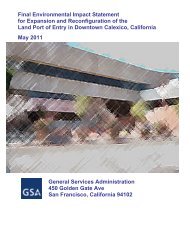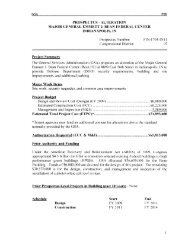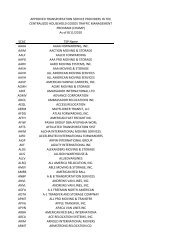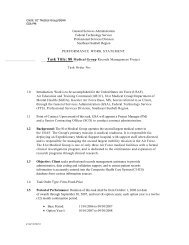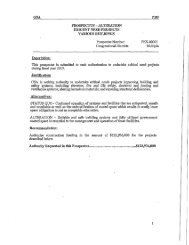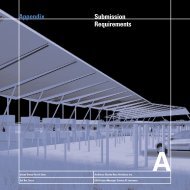FEDERAL MANAGEMENT REGULATION - GSA
FEDERAL MANAGEMENT REGULATION - GSA
FEDERAL MANAGEMENT REGULATION - GSA
You also want an ePaper? Increase the reach of your titles
YUMPU automatically turns print PDFs into web optimized ePapers that Google loves.
§102-3.135 <strong>FEDERAL</strong> <strong>MANAGEMENT</strong> <strong>REGULATION</strong><br />
Subpart D—Advisory Committee Meeting<br />
and Recordkeeping Procedures<br />
§102-3.135—What does this subpart cover and how does<br />
it apply?<br />
This subpart establishes policies and procedures relating to<br />
meetings and other activities undertaken by advisory committees<br />
and their subcommittees. This subpart also outlines what<br />
records must be kept by Federal agencies and what other documentation,<br />
including advisory committee minutes and<br />
reports, must be prepared and made available to the public.<br />
§102-3.140—What policies apply to advisory committee<br />
meetings?<br />
The agency head, or the chairperson of an independent<br />
Presidential advisory committee, must ensure that:<br />
(a) Each advisory committee meeting is held at a reasonable<br />
time and in a manner or place reasonably accessible to<br />
the public, to include facilities that are readily accessible to<br />
and usable by persons with disabilities, consistent with the<br />
goals of section 504 of the Rehabilitation Act of 1973, as<br />
amended, 29 U.S.C. 794;<br />
(b) The meeting room or other forum selected is sufficient<br />
to accommodate advisory committee members, advisory<br />
committee or agency staff, and a reasonable number of interested<br />
members of the public;<br />
(c) Any member of the public is permitted to file a written<br />
statement with the advisory committee;<br />
(d) Any member of the public may speak to or otherwise<br />
address the advisory committee if the agency’s guidelines so<br />
permit; and<br />
(e) Any advisory committee meeting conducted in whole<br />
or part by a teleconference, videoconference, the Internet, or<br />
other electronic medium meets the requirements of this subpart.<br />
§102-3.145—What policies apply to subcommittee<br />
meetings?<br />
If a subcommittee makes recommendations directly to a<br />
Federal officer or agency, or if its recommendations will be<br />
adopted by the parent advisory committee without further<br />
deliberations by the parent advisory committee, then the subcommittee’s<br />
meetings must be conducted in accordance with<br />
all openness requirements of this subpart.<br />
§102-3.150—How are advisory committee meetings<br />
announced to the public?<br />
(a) A notice in the Federal Register must be published at<br />
least 15 calendar days prior to an advisory committee meeting,<br />
which includes:<br />
(1) The name of the advisory committee (or subcommittee,<br />
if applicable);<br />
(2) The time, date, place, and purpose of the meeting;<br />
(3) A summary of the agenda, and/or topics to be discussed;<br />
(4) A statement whether all or part of the meeting is<br />
open to the public or closed; if the meeting is closed state the<br />
reasons why, citing the specific exemption(s) of the Government<br />
in the Sunshine Act, 5 U.S.C. 552b(c), as the basis for<br />
closure; and<br />
(5) The name and telephone number of the Designated<br />
Federal Officer (DFO) or other responsible agency official<br />
who may be contacted for additional information concerning<br />
the meeting.<br />
(b) In exceptional circumstances, the agency or an independent<br />
Presidential advisory committee may give less than<br />
15 calendar days notice, provided that the reasons for doing<br />
so are included in the advisory committee meeting notice published<br />
in the Federal Register.<br />
§102-3.155—How are advisory committee meetings<br />
closed to the public?<br />
To close all or part of an advisory committee meeting, the<br />
Designated Federal Officer (DFO) must:<br />
(a) Obtain prior approval. Submit a request to the agency<br />
head, or in the case of an independent Presidential advisory<br />
committee, the Secretariat, citing the specific exemption(s) of<br />
the Government in the Sunshine Act, 5 U.S.C. 552b(c), that<br />
justify the closure. The request must provide the agency head<br />
or the Secretariat sufficient time (generally, 30 calendar days)<br />
to review the matter in order to make a determination before<br />
publication of the meeting notice required by §102-3.150.<br />
(b) Seek General Counsel review. The General Counsel of<br />
the agency or, in the case of an independent Presidential advisory<br />
committee, the General Counsel of <strong>GSA</strong> should review<br />
all requests to close meetings.<br />
(c) Obtain agency determination. If the agency head, or in<br />
the case of an independent Presidential advisory committee,<br />
the Secretariat, finds that the request is consistent with the<br />
provisions in the Government in the Sunshine Act and FACA,<br />
the appropriate agency official must issue a determination<br />
that all or part of the meeting be closed.<br />
(d) Assure public access to determination. The agency<br />
head or the chairperson of an independent Presidential advisory<br />
committee must make a copy of the determination available<br />
to the public upon request.<br />
§102-3.160—What activities of an advisory committee are<br />
not subject to the notice and open meeting<br />
requirements of the Act?<br />
The following activities of an advisory committee are<br />
excluded from the procedural requirements contained in this<br />
subpart:<br />
(a) Preparatory work. Meetings of two or more advisory<br />
committee or subcommittee members convened solely to<br />
gather information, conduct research, or analyze relevant<br />
102-3-16


